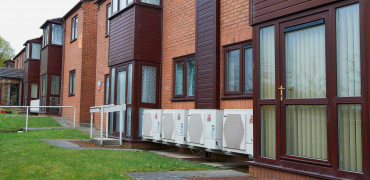In today's ever-evolving world, businesses and organisations are increasingly recognising the urgent need to reduce their carbon footprint.
Heating systems play a crucial role in both energy consumption and emissions, so in this article, Housing Association Magazine’s Joe Bradbury explores the significant role commercial heating can play in helping to decarbonise businesses, with a particular focus on how housing associations can embrace sustainable practices within their own office buildings.
While an immediate transition away from gas may not be feasible for all housing associations, strategic budget planning for the next few years and potential funding opportunities can pave the way for a greener and more sustainable future.
Immediate elimination of gas may not be feasible so strategic planning is key
The importance of decarbonisation
As the detrimental effects of climate change become more apparent, reducing carbon emissions has become a global imperative.
Businesses, including housing associations, have a crucial role to play in this transition.
In many ways, social housing has led the way in sustainable energy use through the early adoption of renewable heating under the previous Code for Sustainable Homes Regulations.
This helped housing associations reduce the use of solid fuel and oil heating for thousands of properties off the gas network. It not only helped to decarbonise the housing stock, but it also took many tenants out of fuel poverty and brought their heating systems into the 21st Century.
But the housing associations themselves haven’t always been able to look at their own operations in quite the same way.
The role of commercial heating
Commercial heating systems are one of the largest contributors to energy consumption and emissions in office buildings. Traditional heating systems often rely on fossil fuels, particularly gas, which releases significant amounts of carbon dioxide into the atmosphere.
Under the Energy Performance of Buildings (England and Wales) Regulations 2012, commercial buildings are required to get an Energy Performance Certificate (EPC) when they are sold or re-let. At the beginning of April 2023, this increased to an ‘E’ rating and the government is proposing that by December 2028, properties will need to have an EPC rating of ‘C’ or above.
This will not be achievable using gas for heating, so businesses are now looking at how they can transition to sustainable heating alternatives as a way of achieving meaningful carbon reduction targets.
Planning for the transition
While immediate elimination of gas-powered systems may not be feasible for all housing associations, strategic planning is key.
Organisations can develop comprehensive decarbonisation plans, encompassing a timeline of 2 to 5 budget periods, to gradually phase out gas heating systems.
This approach allows for budget allocation, identification of suitable alternatives, and collaboration with energy consultants or providers.
Funding opportunities
To support the transition towards sustainable heating, housing associations can explore funding programs like the Public Sector Decarbonisation Fund, which offers interest-free loans to the public sector in the UK for energy efficiency projects.
By accessing such funding, housing associations can invest in renewable heating technologies, such as air source heat pumps, ground source heat pumps, or district heating schemes.
These solutions provide efficient and low-carbon alternatives to traditional gas-powered systems.
Advantages of sustainable heating solutions
Implementing sustainable heating solutions brings numerous benefits beyond carbon reduction.
These technologies often provide improved energy efficiency, resulting in long-term cost savings for housing associations.
Furthermore, renewable heating systems can enhance the comfort and well-being of employees by offering better control over temperature and providing consistent heat.
Raising awareness and engagement
To successfully transition to sustainable heating, housing associations must raise awareness among employees, residents, and stakeholders.
Education campaigns, workshops, and regular communication can help foster a shared understanding of the importance of decarbonisation.
Engaging stakeholders in the decision-making process ensures transparency and allows for valuable input and support.
Beyond heating: Comprehensive sustainability strategies
While focusing on commercial heating is vital, housing associations should also consider adopting comprehensive sustainability strategies.
This includes implementing energy-efficient lighting, optimising insulation, promoting recycling and waste reduction, and embracing renewable energy sources.
By adopting a holistic approach, housing associations can create a greener, healthier, and more sustainable environment for their employees and residents.
In summary
Commercial heating systems play a crucial role in the decarbonisation journey of businesses, including housing associations.
- While immediate elimination of gas may not be feasible for all organisations, strategic planning and funding opportunities can pave the way for a greener future.
- Housing associations can develop comprehensive decarbonisation plans, spanning multiple budget periods, to gradually transition away from gas-powered systems.
- Funding programs like Salix offer a valuable opportunity to access financial support for renewable heating technologies.
- By embracing sustainable heating solutions, such as air source heat pumps or district heating schemes, housing associations can not only reduce their carbon footprint but also enjoy improved energy efficiency and cost savings.
- Additionally, raising awareness and engaging stakeholders in the decarbonisation process are vital for creating a shared understanding and garnering support.
Beyond commercial heating, comprehensive sustainability strategies encompassing lighting, insulation, waste reduction, and renewable energy sources can further solidify the commitment to environmental stewardship.
Together, businesses and housing associations can lead the way toward a greener, more sustainable future.
Joe Bradbury Digital Editor of Housing Association magazine




